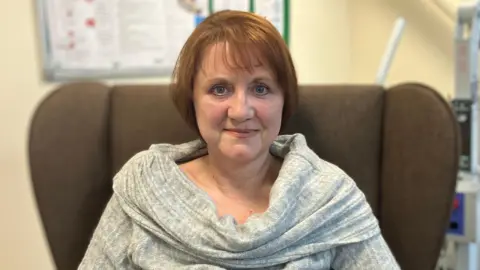Council counts the cost of social care services
 BBC
BBCStruggling to fund care for vulnerable residents is the main reason why Shropshire Council has been on the brink of running out of money for a number of years.
The demand for both adult and children's social care services has increased, largely since the start of the Covid pandemic, which has put incredible strain on the council's budget.
With an ageing population and an anticipated rise in the number of over 65s expected to move to the county in the next 20 years, the demand for social care services is set to increase further.
Debbie Price, who runs 11 care facilities across Shropshire, Telford and Wrekin, has said a long-term funding solution needs to be found to future-proof the industry.
Almost four in every five pounds spent by Shropshire Council is on services like fostering children, residential care placements, homelessness and special educational needs.
An average Band D property in this financial year will contribute £1,395 towards the service, plus an additional 2%, which is added on to council tax bills to spend specifically on social care.
The council also receives grants and funding worth tens of millions of pounds from central government, but it is still not enough.
In fact, 71% of councils overspent on their social care budgets in 2023/24, according to the Local Government Association.
To meet the funding shortfall, other services, such as road maintenance and waste collections, have to be cut, or councils have to generate cash, such as Shropshire Council's £56 garden waste charge.
"Governments have pushed back decisions to do something about social care, to look at how it's going to be paid for," said Debbie Price, who is the chief executive of Coverage Care, which provides residential and nursing homes for 682 people across the county.
"We have got to the point with underinvestment and budget freezes that I genuinely believe that local authorities do not have the money they need in order to provide the services that the people in their communities require.
"A number of really good providers may no longer be able to trade unless central government steps up and does something about this," she added.
'A system fit for the future'
The proportion of the council's budget spent on social care has increased from 58% to 74% in the last eight years.
This is partly due to an increase in the number of children in the care of Shropshire Council, although the rate is starting to slow and stabilise.
As of October, 735 children were being cared for by the council – a rise from 399 in April 2020.
Some of the reasons why more children are requiring social support include a greater awareness of abuse and neglect and also cost of living pressures, such as poverty and unemployment.
Shropshire also has a much older population than England as a whole, with 44% of the county being over the age of 50.
It's thought the county will have more than 15,000 over 85s by 2030.
The government has boosted funding for social care authorities by £3.7bn this financial year and commissioned an independent review into a dedicated National Care Service "to build a system fit for the future that is fair and affordable for all", the Department of Health and Social Care said.
The department hopes that some of the review's recommendations can be delivered before the next general election in 2029.
In the meantime, the next council administration will continue to work with council officers to improve efficiencies.
But if the demand for social care services continues to rise and the funding to pay for it does not keep up, then council leaders may have to find other services to cut to free up funds.
These are often the services that residents interact with on a day-to-day basis, like road repairs, leisure centres and household recycling centres.
Follow BBC Shropshire on BBC Sounds, Facebook, X and Instagram.
